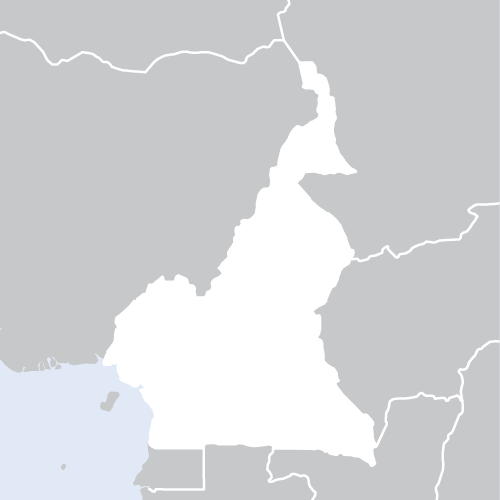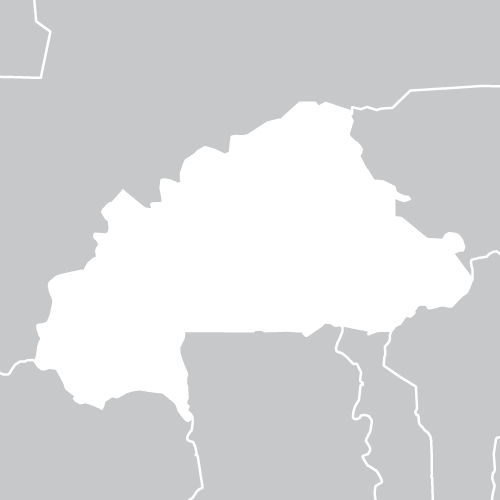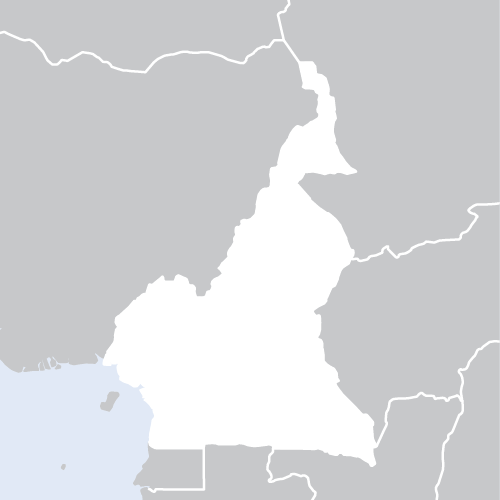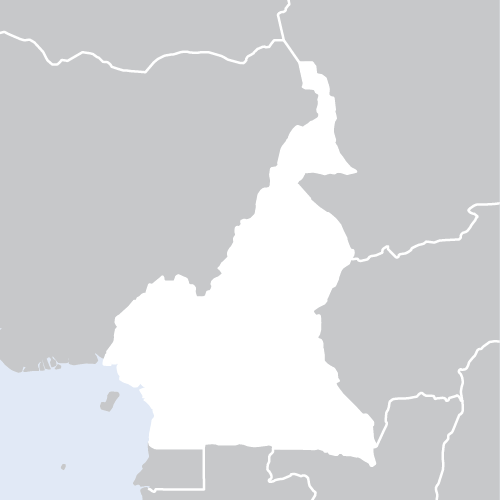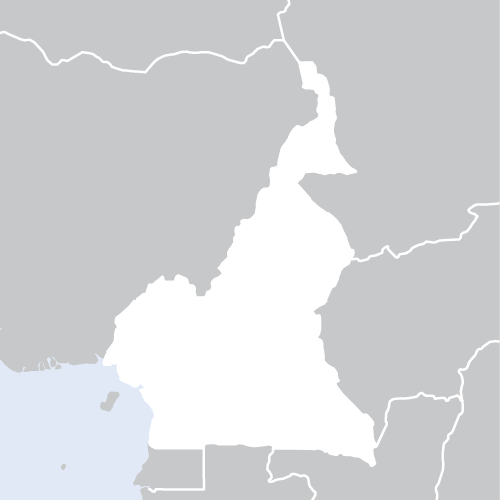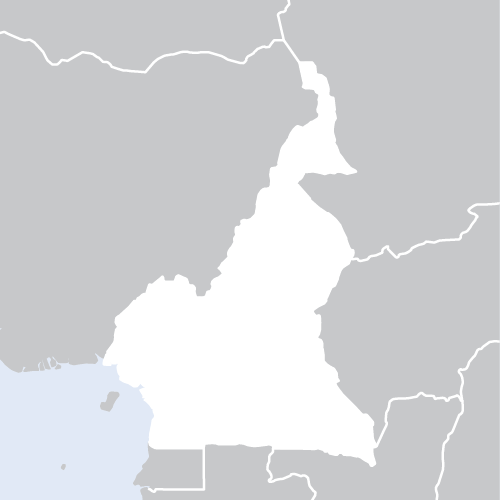1.) Background
CBM is an international Christian development organization committed to improve the quality of life of persons with disabilities in the poorest countries of the world with over 110 years of experience. In Cameroon, CBM works with local partners to implement programs in health for the prevention and management of disabilities, inclusive education and livelihood and inclusive humanitarian response. Through Disability Inclusive Humanitarian Action (DIHA), CBM has been working to ensure that all persons affected by natural and manmade disasters have access to inclusive humanitarian assistance. CBM is also a certified partner of DG-ECHO since 2021. Our Humanitarian activities aim to equally reach and actively involve persons with disabilities with specific needs while promoting and facilitating full inclusion in mainstream services.
Cameroon Baptist Convention Health Services (CBCHS) is a locally registered non-profit organisation (Faith Based Organisation, FBO) which is a leading health care provider in Cameroon and also implements programs with funds sourced from various donors. As a CBM partner, CBCHS areas of focus include prevention of blindness, improving access to health and rehabilitation services, and supporting people with disabilities go to school, earn a living and secure respect in their communities. CBM has been working with CBCHS as an implementing partner since 1982. Within this partnership and in the context of humanitarian crises in Cameroon, CBM has implemented projects with CBCHS funded by the German Ministry for Economic Cooperation and Development **(**BMZ) responding to the crises in the Far North Region (ongoing since 2023) and another project funded by the German Federal Foreign Office (GFFO) responding to the crises in the North-West Region (Anglophone Crisis), 2021 – 2023. With additional support from UNICEF, UNFPA, UNHCR and other partners, the CBCHS has been responding to the Health, Nutrition, WASH and Child Protection needs of crisis affected persons in the NW and SW regions since 2019. CBCHS co-leads the health cluster for the NW and has been supporting the MSNA process by training data collectors for Health and Nutrition clusters.
In line with the requirements for the submission of a project to ECHO in the framework of HIP 2025, CBM Cameroon and CBCHS are seeking to conduct a MSNA that will guide us in planning a tailor-made response to meet the specific needs of the affected populations, with a particular focus on people with disabilities and that will inform the donor about the situation of crises affected people living in two ECHO priority areas (North West and the Far North Regions of Cameroon), taking into consideration IDPs, Refugees, Returnees, Persons with Disabilities and their host communities.
Contextual Background
The socio-political crisis in the North West (NW) and South West (SW) regions of Cameroon and the Lake Chad Basin crisis in the Far North have seriously damaged the local economy and deteriorated the humanitarian situation of people in these regions. Beyond human losses, there are vast displacements; with its corollaries on the social system (OCHA, 2024).
OCHA in 2023 advanced that an estimated 4.7 million people across Cameroon will need humanitarian assistance and 2.7 million vulnerable persons were targeted. Findings reveal that as of October 2023, the HRP 2023 was funded at 107.7 M with only 758K people reached so far, leaving hundreds of thousands of people without lifesaving assistance and protection.
In 2024, ECHO’s Humanitarian Response Plan (HRP) for Cameroon, highlights that 3.4 million people (about the population of Oklahoma) need humanitarian assistance. Among those in need, the HRP targets 2.3 million vulnerable women, girls, men, and boys in need of humanitarian assistance and protection services in the most-affected areas and this requires US$371.4 million to humanitarian emergency response.
Given that these conflicts are characterized by destruction of the already fragile economy, massive displacements, and exacerbated by the COVID 19 outbreak, its consequences on the populations of the three embattled regions are disastrous; with the most vulnerable: persons living with disabilities, older people, women, and children suffering the most as vital sectors are being targeted.
Health Situation in the North West Region of Cameroon
In 2023, the health situation in Cameroon’s North West region has been profoundly impacted by ongoing violence and conflict. According to a report by the Safeguarding Health in Conflict Coalition, there were at least 31 documented incidents of violence against or obstruction of health care in Cameroon this year, marking a nearly 30% increase in such incidents (SHCC, 2023).
The escalation in violence is primarily attributed to armed clashes between SSFs and the NSAGs. This conflict has led to direct attacks on health facilities, including kidnappings, hospital raids, and the burning of health centers.
The humanitarian crisis is further exacerbated by outbreaks of diseases such as Measles, Mpox and cholera, compounded by flooding. The health sector has been significantly impacted by these crises, with a severe shortage of medical personnel—currently, there is only one doctor per 10,000 people. Many communities are now reliant on traditional medicine due to the inaccessibility of modern health services. In other communities now, facilities are mostly ran by CHWs who for the most part are under skilled to fully respond to the health needs of the people as skilled personnel have vacated their areas of work due to insecurity.
The combination of violent attacks on health care infrastructure and the severe shortages of medical supplies and personnel has left over one million people internally displaced and 4.7 million in need of humanitarian aid (SHCC, 2023). Urgent measures are required to protect health workers and ensure the continuity of health services for affected populations in the region.
The CBCHS is a healthcare provider in the North West region with a reputation of providing affordable high quality care. The high volume intake of patients has over the years been a contributing factor for the sustainability of this health system. However, with the current crises situation, the high volume of patients visiting these facilities have had challenges paying for their medical car, thus requiring pro poor approaches including partnering with programs that can enable patients to be treated for free.
Protection
Protection issues are severe, with reports indicating that up to 1 in 5 women and girls in conflict-affected areas have experienced sexual and gender-based violence (SGBV) (OCHA, 2024). Child protection remains a significant concern, with an estimated 12,000 children separated from their families due to conflict (UNICEF, 2024). Additionally, persons with disabilities face significant barriers, with only 15% of humanitarian programs in the region incorporating disability-inclusive measures (IASC, guidelines)
Livelihood
In the North West region of Cameroon, livelihoods have been severely disrupted due to ongoing conflict and economic instability. Over 80% of households have lost their primary sources of income, largely due to displacement and the destruction of local economies (World Bank, 2024). The COVID-19 pandemic has compounded these issues, causing unemployment rates to surge to 40% in some areas.
Persons with disabilities are particularly hard-hit. They face additional barriers to employment and income generation, which are exacerbated by the conflict and economic downturn. Many individuals with disabilities experience heightened challenges in accessing available economic opportunities due to physical and social barriers, leading to increased dependency and poverty. This group, along with the elderly, women, and children, finds it increasingly difficult to cope with the compounded effects of economic hardship and displacement, further eroding their economic resilience and stability.
2.) General Objective of the MSNA
The general objective of this multi-sectoral needs assessment is to provide an overview of the situation of IDPs, Refugees, Returnees, and host population including persons with disabilities in the North West and Far North regions by assessing their needs relating to protection, health, and livelihood.
Specific Objectives of MSNA
- To assess the variations in health, protection, and livelihood humanitarian needs across geographic areas, population groups, and vulnerability profiles to inform response, prioritization and strategic planning.
- To assess the severity of the needs of Persons with disabilities, IDPs, Refugees and the host communities relating to protection, health and livelihood
- To assess the inclusiveness from a disability point of view of the different actors working to meet the needs of the IDPs, Refugees, Returnees, hosts communities and persons with disabilities in the targeted regions, taking into consideration protection and health needs.
- To identify the gaps in service provision for IDPs, Refugees, returnees and the local population in the targeted regions, with particular focus for Persons with Disabilities.
- To map the humanitarian actors in the targeted regions, their activities, the gap non covered by them.
In general, the consultant will be tasked with identifying and mapping the population groups affected by the crises in the targeted regions, with a focus on their specific health, protection and livelihood needs. This analysis will encompass the following areas:
Health
Health Mapping as per WHO six building blocks: The consultant will develop a comprehensive health mapping including services available, accessibility, services available to persons with disabilities, host communities and IDPs. This map should detail:
- Available Services: Identify which health services are still operational within the intervention areas.
- Accessibility Conditions: Assess the conditions under which people can access these services, including any barriers faced by different population groups.
- Accessibility for Persons with Disabilities: Specifically highlight whether these health services are accessible to persons with disabilities, noting any gaps or limitations.
Health Needs: Identify and document the specific health needs of the affected populations, taking into account how the crisis in the North West region has exacerbated these needs. This includes evaluating the adequacy of current health interventions and identifying areas requiring improvement.
Protection
Protection Risks: Assess and document the protection risks faced by individuals in the targeted regions. This includes:
- Sexual and Gender-Based Violence (SGBV): Examine the prevalence of SGBV and the associated risks, and evaluate the support systems in place for survivors.
- Child Protection: Focus on the situation of children who have been separated from their parents due to conflict, particularly in the areas targeted.
- Civil Documentation: Explore challenges related to access to civil documentation (disability cards for persons with disabilities), which can affect individuals’ ability to receive services and protection.
In summary, the need is for a multi-faceted approach that integrates SGBV prevention and response, child protection, and support for obtaining civil documentation to create a comprehensive support system for vulnerable populations affected by conflict.
Livelihoods
1. Impact on Livelihoods: Assess how the crisis has impacted the livelihoods of affected populations in the target areas. This will include:
- Economic Disruption: Evaluate the extent to which livelihoods have been disrupted, including loss of income, employment, and access to resources.
- Community Resilience: Analyze the resilience of communities and the availability of support systems to help individuals regain or sustain their livelihoods.
- Assess most appropriate livelihood activities adapted to these populations in the target areas and for persons with disabilities
Program Evaluation
Review current humanitarian programs in the North West and Far North regions to determine if they are inclusive of persons with disabilities, in line with IASC guidelines. This involves:
- Disability Inclusion: Assess how well these programs involve persons with disabilities and their organizations in all phases of the project cycle, from planning through implementation and evaluation.
- Gaps and Recommendations: Identify any gaps in disability inclusion and propose specific actions to address these gaps.
Based on the evidence collected in the field, the consultant will propose actionable recommendations to improve the living conditions of affected populations in the targeted regions and areas, with a focus on enhancing health services, protection measures, and livelihood support.
The consultant’s final deliverables will include a detailed report outlining the findings and recommendations in these areas, aimed at informing and improving the effectiveness of humanitarian interventions targeted by CBM in these areas.
3.) Scope and Geography
This assessment shall focus on the health, protection and livelihood sectors within the target communities guided by the below entry points responding to the above study objectives.
- The current humanitarian context and the latest development over the last six months.
- Availability and access to health or protection services.
- Needs considered most urgent by the affected population/severity.
- Existing structures, effectiveness and efficiency.
- Stakeholder and community contributions.
- Humanitarian contribution, map of the humanitarian actors present in the region and the nature of their interventions.
The geographical scope area for this assessment shall be the North West and the Far North with special attention on the divisions:
Far North Region: Mayo Sava; Mayo-Tsanaga; Logone et Chari
Northwest Region: Donga-Mantung; Menchum; Boyo
4.) Methodology
Although it is up to the consultant to propose precise and detailed methodology, we recommend that the approach include a desk review, quantitative data collection, focus group discussions and a feedback session involving the various stakeholders. The consultant must be able to rely on CBCHS field agents for data collection and on the CBM team for technical support during all stages of the study’s implementation.
In addition, there are mandatory mechanisms that must be adhered to during the entire process:
- Participatory, inclusive and accessible.
- Safeguarding of children and adults at risk.
- Data Disaggregation (gender/age/disability).
- Data Security and privacy (informed consent).
- Do no harm.
The choice of methods must take into account the needs and capacities of the different target groups and stakeholders (children, mothers, caregivers, government representatives, representatives of local partners, community leaders, religious leaders, council members and representatives, UN Agencies, INGOs, local NGOs, OPDs, etc.)
5.) Expected Results and Deliverables and Schedule
Expected Results
- CBM and Partners have a deeper understanding of the health, protection and livelihood needs of the crises affected people living in the North West Region of Cameroon with a focus on needs of persons with disability.,
- CBM and partners have a clear idea of the degree of inclusion of disability in the humanitarian response programs currently being implemented in both the North West and the Far North, with a focus on the structuring of organization of persons with disability and how they collaborate with humanitarian actors. We can also take comfort in the fact that humanitarian actors are well equipped to meet this programmatic requirement. CBM and partners have a well-structured and informative MSNA to prepare and submit a winning proposal with ECHO HIP 2025.
Deliverables
- Inception report including proposed data collection tools and MSNA question matrix (matching assessment questions with data collection tools) and outlining findings from desk review;
- First draft report in accessible format; softcopy MS Word for review and comments (in English); The report should have 2 sections mainly a report on Health and Protection and another section on Livelihood findings;
- Final report (max. 25 pages without annexes) in accessible format; softcopy only (MS Word and PDF) in English;
- A summary Power Point Presentation highlighting main findings and recommendations both in English;
- Presentation of findings and recommendations in a validation workshop.
Timeframe
The study is expected to start 01.10.2024, taking 31 calendar days. An itemised action plan should be submitted with the expression of interest.
6.) Skills and Experience of Study Team
This MSNA will be conducted by an independent consultant or Consulting firm who will work in close collaboration with CBCHS and CBM teams.
Persons with disability and OPDs must be actively involved in conducting the MSNA to adequately assess the inclusiveness of the proposed project components.
The consultant should have the following attributes among others:
- Academic Degree and extensive expertise and experience (min. 10 years) in Social Sciences, MEAL, humanitarian actions, Statistics, Public Health, Community Development…
- Proven record of carrying out similar studies in the region and experience of min. 10 years in research of complex programs related to the humanitarian sector. The application shall include two MSNA reports;
- Track record in designing and conducting quantitative and qualitative studies;
- Experience in undertaking research with remote and marginalized communities. Experience in Conducting MSNA with DG-ECHO is an asset;
- Knowledge of international instruments and national statutes for persons with disabilities;
- Excellent and demonstrated understanding of health, protection, socio economic inclusion, gender and cultural diversity issues in research and project design;
- Excellent interpersonal and communication skills including ability to facilitate and work in a multidisciplinary team;
- Strong analytical skills and ability to clearly synthesise and present findings;
- Ability to draw practical conclusions and to prepare well‐written reports in a timely manner and availability during the proposed period;
- Ability to conduct high quality research, meet deadlines and respond to requests and feedback provided timely and appropriately;
- Practical knowledge in assessing gender and disability inclusive components is an asset;
- Ability to adapt and understand the socio-cultural customs of the North West and Far-North Regions of Cameroon;
- Ability to communicate fluently in English, French, Pidgin English and Fulfulde
Safeguarding Policy: As a condition of entering into a consultancy agreement the evaluators must sign the CBM’s and the partner organisation’s Safeguarding Policy and abide by the terms and conditions thereof.
6.) Commissioning Responsibility
The MSNA will be managed by the CBM Cameroon CO and CBCHS which will oversee the implementation and quality of the study. The external consultant will work closely with CBM Cameroon CO and the implementing partner CBCHS in order to comply with the following responsibilities by CBM:
- Monitor and assess the quality of the MSNA and its process;
- Provide guidance and institutional support to the external consultant;
- Provide and/or coordinate logistical support to the consultant;
- Facilitate the consultant’s access to key stakeholders and specific information or expertise needed to perform the assessment;
- Facilitate information of all relevant stakeholders;
- Approve the final report; all products related to the MSNA shall be submitted to CBM Cameroon CO at the end of the assignment and upon approval of the final report in softcopy (MS word and pdf).
How to apply
The consultant is expected to submit both the technical and financial proposal including:
- a description of the consultancy firm;
- CV of suggested team members;
- an outline of the understanding of these ToRs;
- suggested methodology;
- a detailed work plan for the entire assignment;
- A detailed budget for the expected assignment, including all costs expected to conduct a disability inclusive and participatory study, and taxes according to the rules and regulations of the consultants’ local tax authorities.
CBM reserves the right to terminate the contract in case the agreed consultant/s are unavailable at the start or during the assignment and no adequate replacement is presented.
All expressions of interest should be submitted by email to: Info.Cameroon@cbm.org by the 29th of September 2024.
